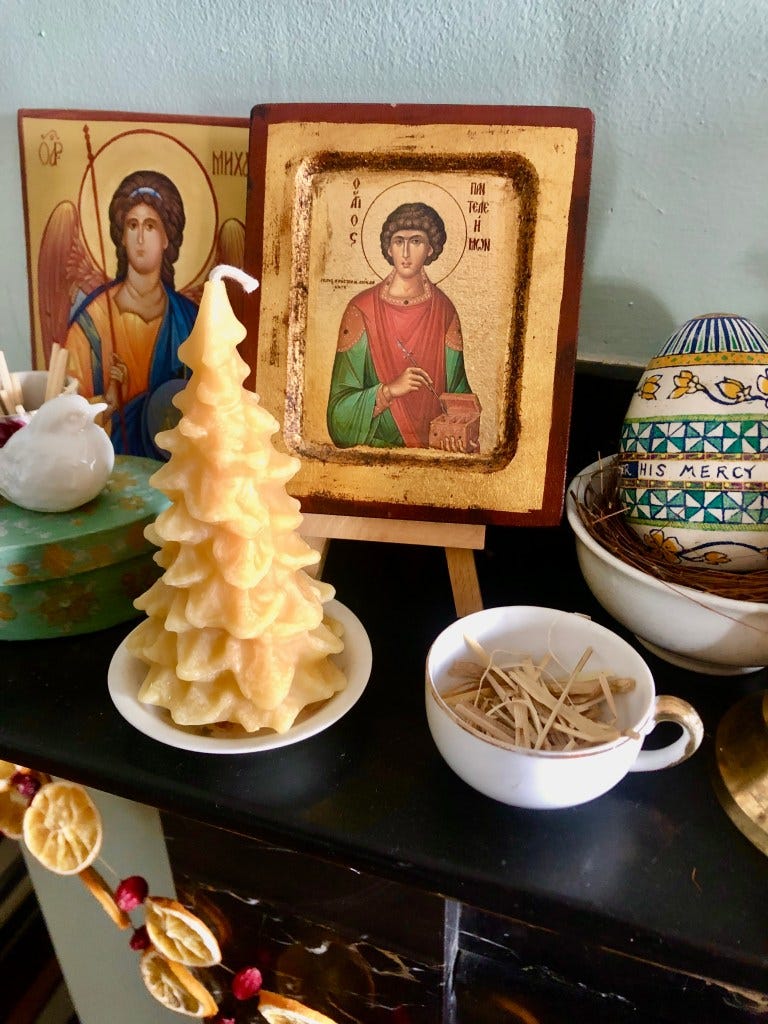Today on Like Mother, Like Daughter, I ponder St. Ambrose’s sermon in today’s Office of Readings. I hope you will join me over there for my (early) Christmas greeting!
The double miracle of grace
In the Liturgy, the days of Advent offer all sorts of almost kaleidoscopic meditations on Salvation History. The ancient and new events are recalled at a brisk pace; linearity is given little heed!
Elijah, John the Baptist, Isaiah, Joseph, Mary, the Second Coming of the Lord — the readings at Mass and in the Hours keep us jumping back and forth.
The intensity of this way of perceiving time reminds me of how I felt as labor came upon me and my baby was about to be born — how every woman feels: my mind went everywhere and my spirit felt completely unsettled, because all the little iron filings of my soul were involved in the seeming chaos of aligning to the True North, the one necessary goal: making this hidden person present.
Today, in the Office of Readings, St. Ambrose offers an incredibly rich commentary on the Visitation of Mary to Elizabeth. (I am putting it below so you can read it all — I encourage you to read it out loud to your spouse and maybe older children too.)
A rationalistic person trying to invent a liturgical season would do things in chronological order, probably; certainly the Visitation would not appear today, four days before Christmas!
God’s ways, though, are wise. Apparently, we simply must have our faces taken by His hands and made to look at certain things — really look!
I think we women can profitably consider the episode as women. Our world (and increasingly, worldly voices within the Church) seems capable only of regarding us as disorderly functionaries who must be pacified with assurances that we can take our place alongside and in opposition to men wherever they happen to be managing things, not questioning how we came to this pass. Sadly, many women cooperate in this pathetic wrangle, robbing us of our true destiny.
But if we delve into the Visitation, letting the words settle in our hearts, we see, as St. Ambrose says, Our Lady bringing her womanly consolation to her elderly cousin whom she knew to be barren, hastening out of her own surely preoccupied state, eager and loving.
When Mary heard this she did not disbelieve the prophecy, she was not uncertain of the message, she did not doubt the example: but happy because of the promise that had been given, eager to fulfil her duty as a cousin, hurried by her joy, she went up into the hill country.
The two women become prophets, St. Ambrose tells us. How often is everyone berated about our neglect of women’s voices in our modern society (where to tell the truth they are only too shrilly heard)? But perhaps we are the ones who have become deaf to every way of communicating except the one that’s strident, most lacking in texture and refinement, and most crashingly utilitarian.
Perhaps we need to recover a different way of seeing:
Read it all over at Like Mother, Like Daughter!
Not ready to subscribe, but enjoyed this post? How about this:





